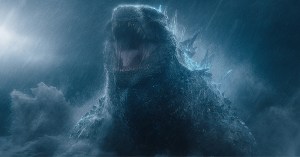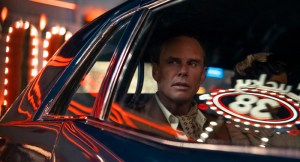Kevin Kline’s Best Movies
In this week's Total Recall, we count down the best-reviewed work of the Last Vegas star.
Michael Douglas, Robert De Niro, and Morgan Freeman’s names might come first in the posters for this weekend’s Last Vegas, but the fourth name on that list boasts a pretty impressive résumé in his own right. In fact, with an Oscar and a pair of Tonys to his credit, Kevin Kline is one of the better-resprected actors of his generation — which is exactly why we decided to dedicate this week’s list to a look at some of the brightest critical highlights from his distinguished career.
10. In & Out
Howard Brackett (Kevin Kline) seems to have it made — he’s a well-liked English teacher and coach at his small-town high school, with a wedding to his fiancee (Joan Cusack) on the horizon and a former student (Matt Dillon) up for an Academy Award. But Howard’s world comes unglued after his ex-pupil uses the Oscar telecast to tell the world that Howard’s gay — a revelation that proves shocking for everyone, most of all Howard, who thinks of himself as heterosexual. A comedy of errors ensues, ably supported by a cast that also includes Tom Selleck and Bob Newhart, and although it’s a premise that probably wouldn’t fly today, it was handled so nimbly by director Frank Oz and writer Paul Rudnick that most critics couldn’t complain too much. “A man questioning his own sexuality does not seem like the ideal topic for a comedy,” admitted Cinematter’s Madeleine Williams. “But with a good script, and plenty of humor, In & Out tackles this touchy subject matter with aplomb.”
9. Silverado
Once you cast Brian Dennehy as your movie’s bad guy, you’ve won half the battle. Fortunately for Silverado director/co-writer Lawrence Kasdan, he also managed to line up a pretty capable cast of heroes for his stylishly assembled Western. Kevin Kline, Kevin Costner, Scott Glenn and Danny Glover all saddled up and rode against Dennehy’s crooked sheriff, and even the supporting cast managed to shine, with memorable turns from Jeff Goldblum, Linda Hunt, and Rosanna Arquette. Westerns weren’t exactly in vogue during the mid-’80s — especially ones as unabashedly retro as this one — but according to most critics, Silverado made it work; as Roger Ebert wrote, “This is a story, you will agree, that has been told before. What distinguishes Kasdan’s telling of it is the style and energy he brings to the project.”
8. The Pirates of Penzance
The next time you find yourself wondering why more big movies don’t premiere on-demand at the same time they’re in theaters, think about The Pirates of Penzance. A film adaptation of the Broadway hit, starring most of the original stage cast, it bowed to widely positive reviews; problem was, it had a hard time holding on to theatrical engagements due to Universal’s decision to simultaneously send the movie to a pay-TV service. Thus did ticked-off theater owners opt to shun our cinematic Pirates, and lo did the audience suffer — at least in the estimation of most critics, who felt that the cast (including Kline, Linda Ronstadt, Angela Lansbury, and Rex Smith) did a fine job of bringing the stage musical to the screen. In addition to a “well made musical,” Michael A. Smith of Nolan’s Pop Culture Review deemed it “Proof that Kline can do ANYTHING!”
7. Cry Freedom
The life of legendary anti-apartheid activist Steve Biko got its big-screen due with Richard Attenborough’s Cry Freedom, starring Denzel Washington as Biko and Kline as Biko’s journalist friend Donald Woods, whose books formed the basis for John Briley’s screenplay. Although it arrived at a moment when the South African government’s racially oppressive policies were under particularly harsh scrutiny on the international stage, Freedom‘s stark drama proved a tough sell for American filmgoers, who mostly failed to turn out during its theatrical run. Critics found it problematic due to what Roger Ebert termed its “liberal yuppie” focus, although he went on to admit, “Cry Freedom is a sincere and valuable movie, and despite my fundamental reservations about it, I think it probably should be seen.”
6. Sophie’s Choice
One of the heaviest Holocaust movies of the 1980s, Sophie’s Choice found writer/director Alan J. Pakula adapting William Styron’s heartbreaking novel into an equally shattering film, starring Meryl Streep as the titular protagonist, Kline as her emotionally unwell lover, and Peter MacNicol as the young novelist whose arrival at their Brooklyn boarding house coincides with a particularly fraught period in their lives. While its sad story and deliberate pace proved an unappealing blend for some scribes, most critics were won over by the movie’s stellar performances, led by Streep’s Oscar-winning work. “Though it’s far from a flawless movie, Sophie’s Choice is a unified and deeply affecting one,” wrote Janet Maslin for the New York Times, “thanks in large part to Miss Streep’s bravura performance, it’s a film that casts a powerful, uninterrupted spell.”
5. Grand Canyon
In 1991, Kline reunited with his Silverado director Lawrence Kasdan for a very different kind of project: Grand Canyon, a thoughtful ensemble drama about a group of Los Angelenos (including Kline’s Silverado castmate Danny Glover) thrown together across racial backgrounds and class lines. Though not without superficial similarities to Kasdan’s 1983 hit The Big Chill, Canyon found the writer/director in a gloomier state of mind, observing the country’s widening income gap with just enough compassion to overcome his script’s more heavy-handed moments. “Even when he wasn’t trying, Kasdan’s camera found tragedy, as with the opening footage of Magic Johnson, filmed before anybody knew he had the AIDS virus,” observed the Washington Post’s Rita Kempley. “The filmmaker and his team have truly caught society on the verge.”
4. A Prairie Home Companion
One of America’s longest-running radio programs celebrated its 31st birthday in style with this Robert Altman-directed ensemble dramedy, an artful blend of fact and fiction that dramatizes one very important night behind the scenes. Completed mere months before Altman’s death, it provided a worthy closing statement for one of Hollywood’s most dignified careers — and gave Harrelson an opportunity to rub shoulders with a cast that included Meryl Streep, Lily Tomlin, Tommy Lee Jones, John C. Reilly, and Kline. “It sparkles with a magic all its own as an engagingly performed piece of Midwestern whimsy and stoicism,” wrote Andrew Sarris for the New York Observer, adding, “Mr. Altman’s flair for ensemble spectacle and seamless improvisation in the midst of utter chaos is as apparent as ever.”
3. The Ice Storm
He probably wasn’t the first director that anyone expected to weigh in with a trenchant observation on the American cultural mores of the 1970s, but that’s exactly what Ang Lee did with 1997’s The Ice Storm — an impeccably cast, sensitively filmed adaptation of the acclaimed Rick Moody novel about the largely unspoken divisions festering in a well-to-do suburban Connecticut family headed up by former Dave castmates Kevin Kline and Sigourney Weaver. Replete with sadness and populated by deeply flawed characters, Storm could have been an unintentional parody of the 1990s indie scene in less capable hands — but instead, as Rick Groen wrote for the Globe and Mail, it’s “a remarkable film that takes us straight into John Updike territory, duplicating on screen exactly what the writer achieves on the page.”
2. A Fish Called Wanda
Kline picked up a Best Supporting Actor Academy Award for his work in A Fish Called Wanda, a feat made all the more impressive by the stellar company he’d been keeping onscreen — with a cast that included Jamie Lee Curtis, John Cleese, and Michael Palin, this heist caper about bumbling jewel thieves boasted one of the decade’s more remarkable comedic pedigrees. Cleese, who wrote the script and co-directed with Charles Chrichton (both earning Oscar nominations along the way), put all these ingredients to work in the best way — namely, by bringing some very funny people together and giving them some very silly things to do. “Wanda defies gravity, in both senses of the word, and redefines a great comic tradition,” marveled TIME Magazine’s Richard Schickel.
1. Dave
Dave is nothing if not laughably unrealistic — a temp agency owner (Kline) stands in for the President, hires an accountant to fix the federal budget, and dreams up a jobs bill that will provide work for anyone who wants it, making the First Lady (Sigourney Weaver) fall for him along the way — but even in the go-go 1990s, it appealed to our best and brightest hopes for our elected leaders, and in today’s vituperative political climate, it’s more of a funny, warm ‘n’ cuddly fable than ever. Janet Maslin of the New York Times was certainly charmed during its original release, admitting that “In spite of this sogginess, and despite a self-congratulatory, do-gooder streak that the film discovers within Dave, this comedy remains bright and buoyant much of the way through.”
In case you were wondering, here are Kline’s top 10 movies according RT users’ scores:
1. Life as a House — 86%
2. Sophie’s Choice — 86%
3. Cry Freedom — 85%
4. The Ice Storm — 79%
5. A Fish Called Wanda — 77%
6. The Big Chill — 76%
7. Silverado — 75%
8. The Pirates of Penzance — 75%
9. Trade — 72%
10. Joueuse (Queen to Play) — 71%
Take a look through Kline’s complete filmography, as well as the rest of our Total Recall archives. And don’t forget to check out the reviews for Last Vegas.
Finally, here’s Kline playing the prince of Denmark:






